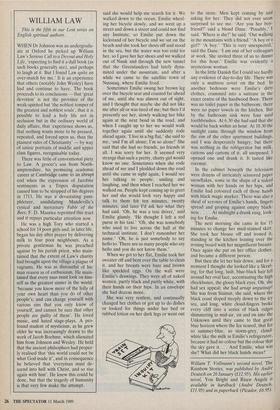WILLIAM LAW
This is the fifth in our Lent series on English spiritual authors.
WHEN Dr Johnson was an undergradu- ate at Oxford he picked up William Law's Serious Call to a Devout and Holy Life, 'expecting to find it a dull book (as such books generally are), and perhaps to laugh at it. But I found Law quite an over-match for me.' It is an experience that others (notably John Wesley) have had and continue to have. The book proceeds to its conclusions — that 'great devotion' is not the province of the weak-spirited but 'the noblest temper of the greatest and noblest souls', that it is possible to lead a holy life not in seclusion but in the ordinary world of daily affairs, that 'experience shows us, that nothing wants more to be pressed, repeated, and forced upon us, than the plainest rules of Christianity' — by way of satiric portraits of middle and upper class figures, recognisable. today.
There was little of conventional piety to Law. A grocer's son from North- amptonshire, his promising academic career at Cambridge came to an abrupt end when the expression of Jacobite sentiments in a Tripos disputation caused him to be stripped of his degrees in 1713. He was a devastating pam- phleteer, annihilating Mandeville's cynical and mercenary Fable of the Bees; F. D. Maurice reprinted this tract and it repays particular attention now.
He was a high Tory who started a school for 14 poor girls and; in later life, began his day after prayer by delivering milk to four poor neighbours. As a private gentleman he was preached against by his parish priest, who main- tained that the extent of Law's charity had brought upon the village a plague of vagrants. He was as distrustful of hu- man reason as of enthusiasm. He main- tained that every man must look on him- self as the greatest sinner in the world: 'because you know more of the folly of your own heart than you do of other people's; and can charge yourself with various sins that you only know of yourself, and cannot be sure that other people are guilty of them'. He loved music, and hated stage-plays. A pro- found student of mysticism, as he grew older he was increasingly drawn to the work of Jacob Boehme, which alienated him from Johnson and Wesley. He held that the ancient philsophers had proper- ly realised that 'this world could not be what God made it', and in consequence he believed that 'everyman must de- scend into hell with Christ, and so rise again with him'. He knew this could be done, but that the tragedy of humanity is that very few make the attempt.


























































 Previous page
Previous page